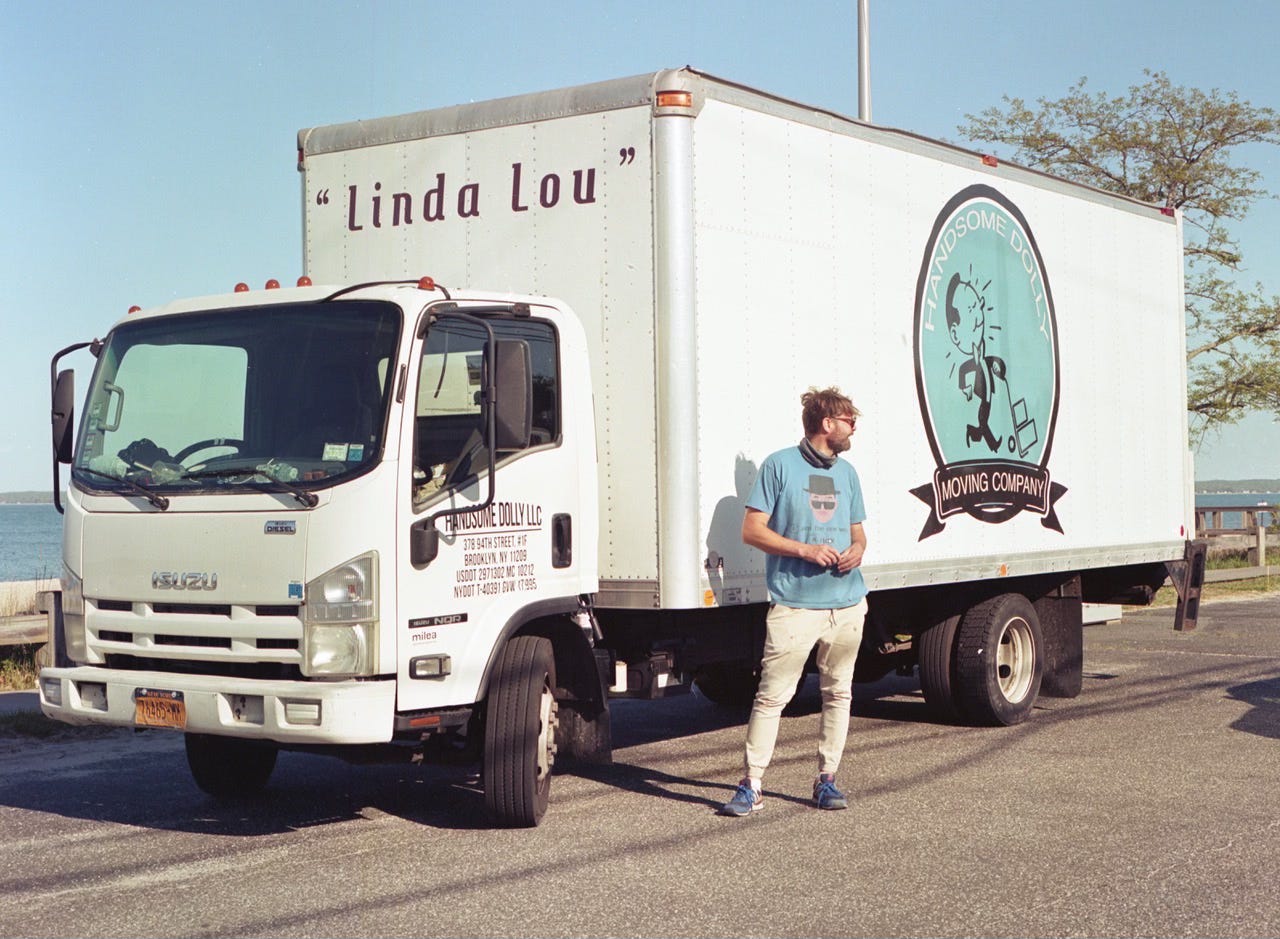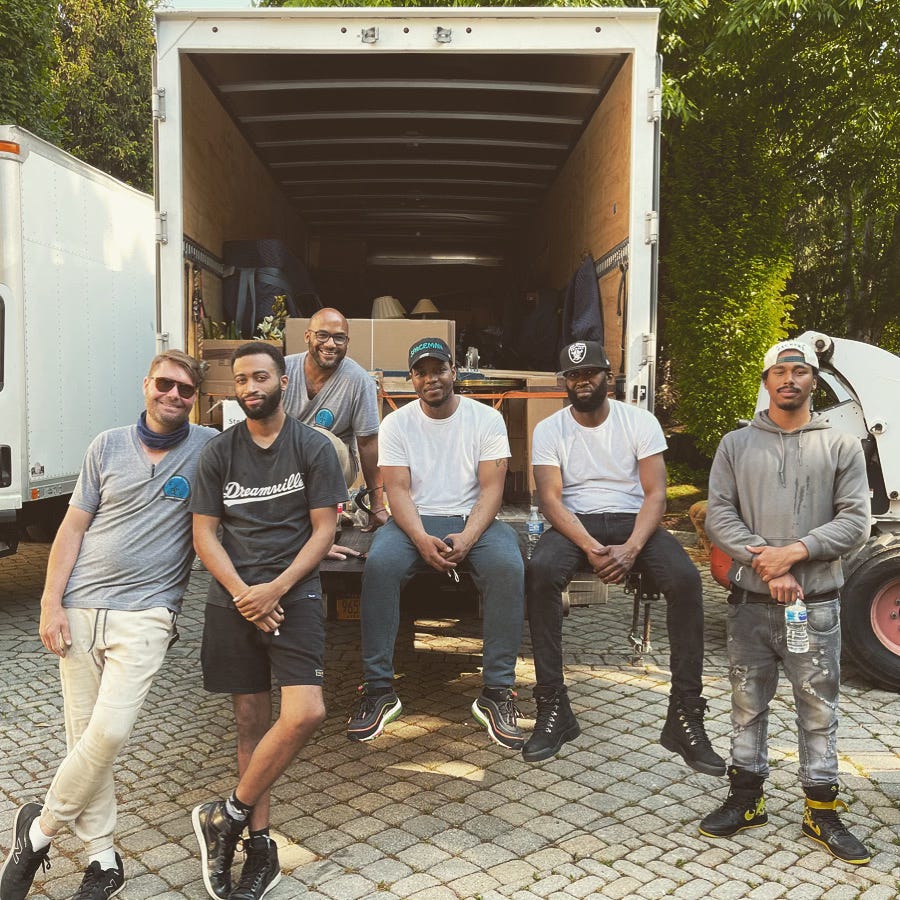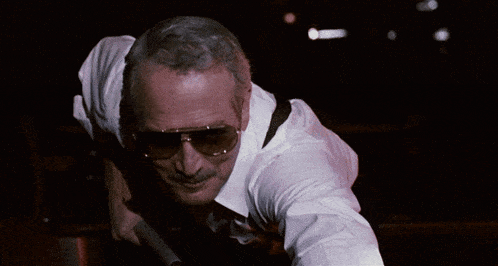How I Ended Up Owning a Moving Company
(and Stopped Writing for 10 Years)
Just a normal day at the moving job—by then, I’d worked my way up to foreman.
The previous fall, the engine of Gondolli Expert Moving’s lone, ramshackle truck had caught fire—during, of all things, my own ill-fated move to Staten Island.
This left us with a suboptimal logistical solution—I’d pick up a rental truck, then meet Gondolli himself at the job site in his pickup, in which he carried the necessary tools: dollies, moving blankets, rolls of tape, shrink wrap.
Garth Gondolli was a fit, Napoleon-complexed, Franz Kafka–looking fellow with a nouveau-riche coke habit, a fondness for puns, and a tattoo on his left forearm that said “Go to work”—a phrase that became the rallying cry of the small, unlicensed moving company he’d been running under the radar for seven years.
Garth had a hit on his hands. The Park Slope stroller hooligans loved his folksy Floridian charm, and his Yelp reviews were strictly five-star.
He had amassed a moving crew of mostly handsome-ish, educated starving artists and other unconventionalists who wanted to make money by staying fit, not by sitting behind a desk. And he paid a living wage of $20/hour, which was primo crema in the 2010s.
Thus, the Renaissance mover was born: overeducated, English-speaking guys who could run your boxes up and down stairs for twelve hours a day while also talking about art, literature, sports if you so desired.
I was one of these guys. I took the job after making Regretting Fish (my second feature film) and running it through the festival circuit. I was broke, burned out from funding three years of a small theater company to stage my plays, and waiting on a distribution deal from an industry in the middle of an extinction event. VOD was just taking hold, and uncertainty was the only certainty. Looking back, I can’t think of a worse time to release an indie film than 2012.
I needed a job, and this one seemed ideal. It stole my body but spared my mind. I’d come home physically wrecked, but my brain still had gas in the tank. As foreman, I had to think a bit more—but the money was good, and business was booming.
But the growth didn’t go unnoticed.
Licensed moving companies were gunning for Gondolli. As the operation got recklessly larger, the threat of being shut down was always in the air in a third-act-Scarface-kinda way. Competing companies had even begun warning customers when they called for estimates and cited our low-low prices: Don’t use this guy, he’s not even licensed.
So, when we showed up for a job at a new building in Long Island City, we should have seen it coming. But, this is what all criminals say.
I arrived with the rental truck to meet the crew and parked in the rear of the building by what we thought was the service entrance. Garth was stuck in traffic and running late with his pick-up truck filled with moving supplies, so I decided to go and greet the customer and get a lay of the land.
When I saw the building’s front entrance, I found it peculiar—it looked like it was still mostly under construction. But when I stepped into the lobby, it was mostly finished, and there was a doorman in full uniform. Just as I approached him, two DOT agents emerged from the mailroom and flashed their badges. They had booked the job. It was a sting.
They inspected the truck.
“Where’s your Bill of lading? Your Order for service?”
“I don’t know what those things are,” I replied.
“Where are your pads for protecting furniture?”
“It’s a rental. The boss is bringing the supplies.”
They exchanged sideways glances like two prohibitionists who just axed a barrel and found it was filled with maple syrup instead of hooch. The problem for them was that the DOT regulates and writes violations for trucks and gives those violations to the owners. Since we were in a rental truck with nothing in it, they had a bust but no bite.
This didn’t stop them from keeping me for the next two hours while they figured out how to write up some kind of violation for Gondolli Expert Moving while reassuring me that I was not in trouble.
Afterward, I returned the rental truck and called Garth. He told me to swing by his apartment in Cobble Hill.
When I got there, he was calmer than I expected. Resigned, almost.
“Remember when we discussed the possibility of me selling this fucking business to you?”
“Yeah.”
“I guess this whole thing probably changes your mind.”
“Not at all.”
“Really?”
“Yes. Really. How much?”
“Twenty thousand.”
“I can get it,” I said.
Not me. I was still broke. But my wife had it, and she had always loved the idea. She was eager for me to have a title that sounded legitimate—not just an aspiring filmmaker or a starving artist, but a business owner.
When I got back to our condo in Staten Island and told her the news, she was ecstatic. It was the most excited I’d seen her during our marriage—a marriage that, honestly, had dulled the passion between us. Everything had become routine. But I saw that spark in her eyes again—like she saw my potential, like she believed I still had the ability to become something.
She happily agreed to lend me the money, and I bought the moving company.
And let’s be clear—when I say I “bought a moving company,” here’s what I got: no truck, three or four dollies, some moving blankets, a few random tools, and a storage shed on the Gowanus Canal on 9th Street. There was a parking spot available if I wanted it. But what I really bought was a brand—a five-star Yelp page, a Gmail account with contacts, a phone number. That was the value.
I spent the next year running the business illegally like a smuggler, dodging DOT agents like they were Eliot Ness. The truth is that I loved being a household goods pirate.
Each morning, I’d grab a rental, load it up, do the job, then unload it all back into the shed on 9th Street before returning the truck. My days were long. Really long. But the money was right.
The company was a smashing success. Customers loved us, and our reputation grew. And after that first year, I finally saved enough to pay cash for my first moving truck.
I hired a lawyer to help me get the company licensed and rebrand it as Handsome Dolly. I was on my way.
Months later, I found out my wife was having an affair. We both agreed it was over. She took the condo and the equity; I took the business, the car, and we called it even.
In 2019, I moved back to Brooklyn and got an apartment in Bay Ridge, anxious to have my own place and some isolation. Handsome Dolly was my refuge and obsession while I healed.
In March of 2020, I relocated the first of many New Yorkers who used the pandemic as an excuse to flee the city for good. I moved a client cross-country to Montana and ended up spending a month in a cabin after the job. When I finally got back to New York, we didn’t stop working for four straight months. I had to buy another truck just to keep up.
By then, I was completely immersed in the business, and along with boxes, sofas and armoires, I was carrying the corpse of my artistic self up and down stairs with me. I had stopped writing altogether.
The moving business was more financially successful than any movie or play I had ever written. So, the brain does what the brain does in a capitalistic society: this is who I am. I was no longer a writer—I was the owner of a moving company.
The company kept growing, and the financial success kept piling on. Before I knew it, I was driving expensive pieces of furniture across the country for wealthy clients.
On one such occasion, I picked up items from four different designers in New York and drove them to Minneapolis—just one of many luxury long-haul jobs I’d done by then. On the way back, I swerved to avoid hitting a deer, ran up on a rock, and flipped the 22-foot box truck I had just bought.
After axing my windshield, the fire department of Jersey Shore, PA removed me, placed me in an ambulance and rushed me to the hospital.
The CT scans called the concussion “minor,” but the cracked ribs and contusions argued otherwise.
Everyone responds to trauma differently. I did the only thing I knew how to do: keep working and self-medicate.
But booze and street-Xanax can only take you so far. Less than a month later, I collapsed on the job from a seizure and woke up in the back of another ambulance.
That’s when I realized it was time to take it easy. I hired an old employee to run the company for me, and I booked a flight to Costa Rica and disappeared in the jungles of Montezuma for a month to decompress and get my head right.
The howler monkeys woke me up at dawn every morning, and I’d have my coffee, a spliff, then sit and write on my porch, watching the family of iguanas that slowly grew to trust me.
Little by little, I started to get some sense of myself back.
I made a decision when I got back: I was going to keep my distance and continue to let my new hire run the company while I stayed behind the scenes and booked the jobs. This way I could focus on writing.
I had teams out there. Let the company grow on its own.
That’s not what happened.
People weren’t hiring the company. They were hiring me. That’s what they wanted. But Handsome Dolly wasn’t who I was. Hence the existential funk. Søren Kierkegaard is undefeated.
I started distancing myself even further from the jobs. And when I stopped showing up, the jobs started drying up.
As each year passed, business got slower and slower, and I watched as the company withered on the vine until it perished.
To pay the bills, I got my TLC license and started driving an EV rideshare at night, so I could write during the day. There’s a tranquility to driving in New York City at night. It gave me time to think and material, lots of it.
In September 2024, I sold “Linda Lou” for a measly $4,750 after it was on Craigslist for a couple weeks. The honest truth is that I would’ve given the fucking thing away if I hadn’t sold it in thirty days.
Eight months later, I finished my first screenplay in over a decade — a comedy about a South Brooklyn family who owns a golf course, which I’m now trying to get made.
Handsome Dolly is now dead by my own hand—the proper way for one’s creations to meet their ultimate demise.
In the end, the only real profit from the moving company was the stories—which, for a writer, is the best kind of return.





